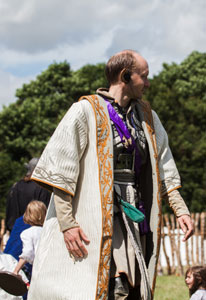Radio protocol
Introduction
Everyone wants a radio - they're exciting and cool. They're also expensive and we tend to lose one an event, costing a thousand pounds a year to replace. The more people who have radios, the harder it is to keep track of them, and the harder it is to use them with more people on each channel. For these reasons it is important to limit the number of radios we use and to ensure that everyone uses proper radio protocol.
Allocation
Radios are allocated to crew in advance of the event - do not take a radio unless it has your name on it.
Radio allocation is done through the teams - if you believe that you need a radio then speak to your team leader. It is the responsibility of the team leaders to ensure that they have enough radio users in their teams.
Radio Protocol & Use
When you want to speak to someone on a radio, press the speak button, wait half-a-second (it takes a moment to engage) and then say your name clearly and ask for the person or department you want to talk to.
Several channels have high levels of use - do not hold a conversation with another radio user on any channel that is for contact purpose. Use the contact channel to locate the person you want to talk to and then then go to an adjacent conversation channel to communicate with them.
In particular, please do not swear over an open radio channel, as this is illegal. I appreciate nobody ever gets done for it, but swearing and playing games on the radio risks getting us into trouble and is a pain in the ass for those people who are trying to work.
Emergencies
Any emergency at an event should be reported by radio to the relevant head of department. If your radio channel is being used to convey emergency information then you do not use that radio channel for any other reason. Keep the channel clear so that the crew who are responding to the emergency can use it.
Radio Channels
| Channel | Use |
|---|---|
| 1 | Site Contact |
| 2 | Site Conversation |
| 3 | God/Gate Contact |
| 4 | Gate Conversation / Ref Conversation |
| 5 | Ref Contact |
| 6 | Ref Conversation 2 |
| 7 | Plot Contact |
| 8 | Plot Conversation |
| 9 | Egregore contact |
| 10 | Egregore Conversation |
| 11 | Skirmish contact |
| 12 | Skirmish Conversation |
| 13 | Skirmish Conversation 2 |
| 14 | Civil Service |
| 15 | First Aid |
| 16 | Security / Academy / Weapon Check |
Site Contact
Site contact is the primary contact channel for all site team. It includes sparkies, hygiene and the people controlling vehicle movements.
Banksmen
When individual crew are operating vehicles like tractors or the hook loaders, they should operate their conversations on one of the higher channels - ideally one of the conversation channels which is unlikely to be busy before time-in.
